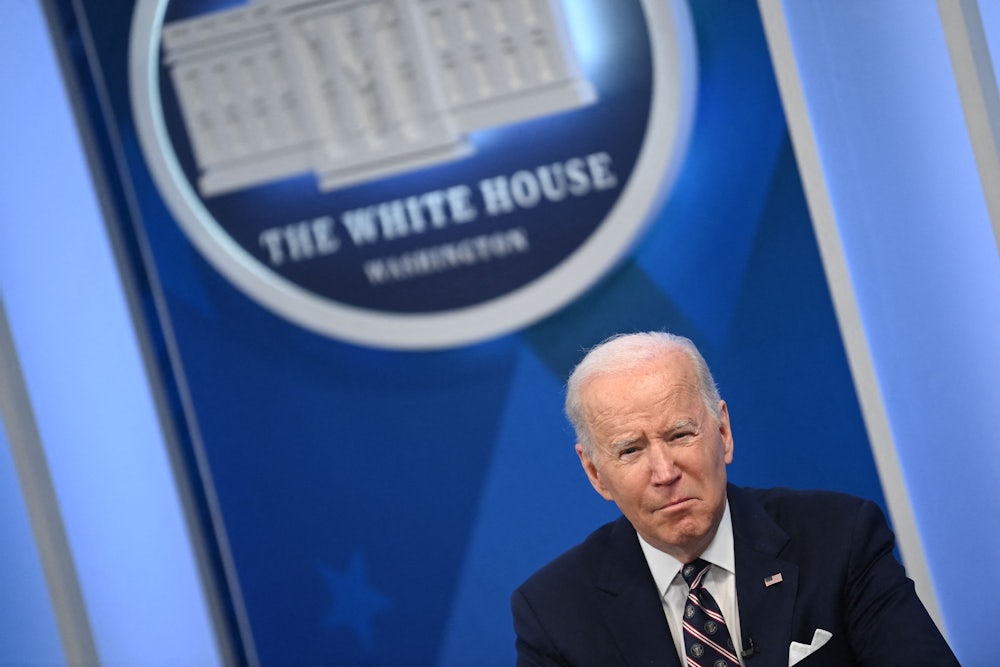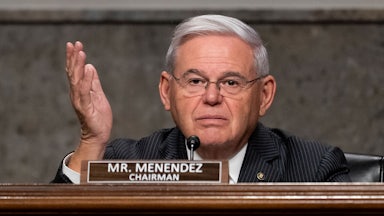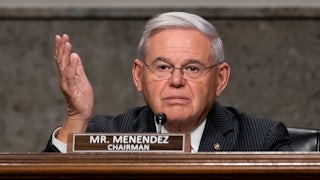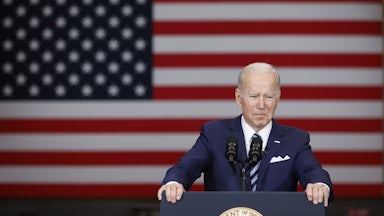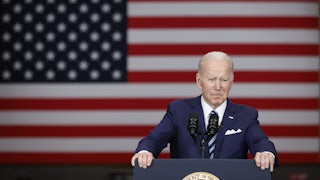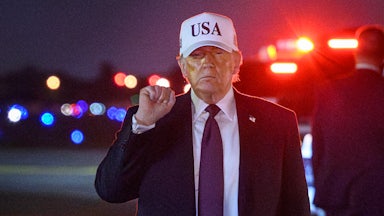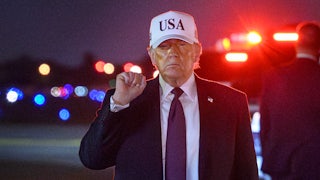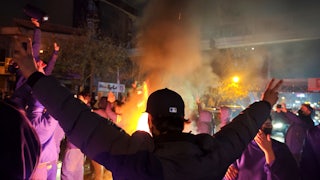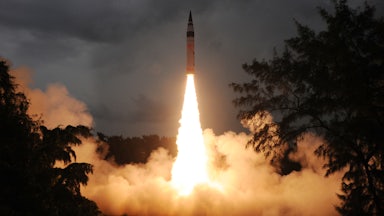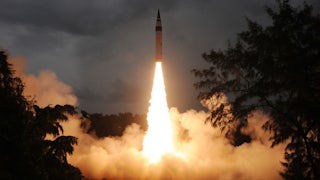President Joe Biden announced wide-ranging sanctions on Russia on Tuesday, in response to what he described as “the beginning of a Russian invasion of Ukraine,” joining European allies in imposing economic penalties for what he called “a flagrant violation of international law.”
Russian President Vladimir Putin on Monday recognized two separatist-held territories in eastern Ukraine as independent, and ordered troops into the region, while Russia’s parliament authorized the use of military force abroad on Tuesday. Putin also delivered a lengthy and angry speech on Monday, rewriting history to claim that Ukraine had never truly been a state. “He’s setting up a rationale to go much further. This is the beginning of a Russian invasion of Ukraine,” Biden said, announcing the “first tranche” of sanctions against Russia in response, with more to come if Putin continues to escalate.
This “first tranche” will target two major Russian financial institutions, as well as Russian sovereign debt, Biden said, with more sanctions in the coming days on Russian elites and their families. Biden has pledged that the United States would not send troops to Ukraine, which is not a NATO country. “These are totally defensive moves on our part. We have no intention of fighting Russia,” Biden said on Tuesday, although he added that the U.S. would continue to provide defensive assistance to Ukraine.
Biden’s announcement comes after German Chancellor Olaf Scholz announced on Tuesday that his government would halt the Nord Stream 2 pipeline in light of the invasion. The question of blocking the pipeline had been a sticky subject in Congress, where Republicans and Democrats had disagreed about how and when to impose sanctions related to the pipeline on Russian entities. The European Union also agreed to a sanctions package that would target top Russian lawmakers and “individuals and entities who are undermining Ukraine’s territorial integrity, sovereignty and independence” covering “political, military, business and media sectors,” Europe’s top diplomat announced on Twitter.
The White House’s response has evolved considerably over the past 24 hours. On Monday, Biden issued an executive order prohibiting trade, investment, and financial transactions with the two territories. But his administration initially shied away from using the word “invasion,” as that would trigger a lineup of hefty sanctions. In a call with reporters on Monday evening, a senior administration official noted that “Russia has occupied these regions since 2014.” However, deputy national security adviser Jon Finer said in an interview with CNN on Tuesday morning that Russia’s actions amounted to the “beginning of an invasion.” “An invasion is an invasion, and that is what is underway,” Finer said.
Christopher Miller, an assistant professor of international history at the Fletcher School at Tufts University, said that the sanctions the U.S. announced on Monday were “close to inconsequential” and that the Biden administration felt pressure to up the ante nationally and abroad, particularly after Germany announced it was halting the Nord Stream 2 pipeline. “In some ways, the U.S. looked out of step with its European allies,” said Miller, who is also the co-director of Fletcher’s Russia and Eurasia Program. “The fact that the Germans have been more resolute than the U.S. [Tuesday] morning doesn’t suggest to the Russians that they ought to be afraid.”
Should the conflict escalate to a full-scale invasion of Ukraine, it could be the largest conflict in Europe since World War II, possibly resulting in tens of thousands of deaths and roiling the global economy. Russia does not have a large economy, but European countries rely heavily on its natural gas supply. Oil prices approached $100 per barrel on Tuesday, the highest in over seven years, and European gas futures jumped more than 13 percent. Putin may retaliate to sanctions with cyberattacks akin to those Russia was charged with deploying at the end of last week, which targeted Ukraine’s ministry of defense, as well as several large banking institutions.
“Defending freedom will have costs, as well, for us here at home. We need to be honest about that,” Biden said, although he added that the sanctions would harm the Russian economy far more than the American economy.
Miller said that the potential effects on the American economy were part of Biden’s “calculus” in determining how far the U.S. should go in meting out punishment to Russia, but those repercussions needed to be weighed next to the costs of a possible large-scale war in Europe. “Next to that risk, the cost of sanctions on us or our friends in Europe is really not that large, especially considering the fact that whatever price we end up paying for sanctions will be paid multiple times over, in some cases 10 times over, by Russia,” Miller said.
Biden has the authority to take decisive action without Congress, which has so far failed to act on its own accord to punish Russia. The Senate recessed last week without a deal on a bipartisan sanctions package, as negotiations were stymied by disagreements over whether to implement them before or after Putin decided to invade Ukraine. Instead, the Senate voted on a resolution to show support for Ukraine, and a bipartisan crew of Senate leaders released a strongly worded statement warning Russia against invasion.
“Should Vladimir Putin further escalate his ongoing assault on Ukraine’s sovereignty, Russia must be made to pay a severe price. We are prepared to fully support the immediate imposition of strong, robust, and effective sanctions on Russia, as well as tough restrictions and controls on exports to Russia, and we will urge our allies and partners in Europe and around the world to join us,” said Senate Majority Leader Chuck Schumer and Senate Minority Leader Mitch McConnell last week, joined by the majority and minority whips and the chairs and ranking members of the Armed Services, Banking, Foreign Relations, and Intelligence committees.
Congress is out of session this week, which means it cannot vote on a sanctions package even if it could agree on one. But members of Congress quickly began pressing Biden to take action on Monday evening, in a deluge of statements that began among Republicans but was echoed by some Democrats, as well.
“Putin must be made to pay a far heavier price than he paid for his previous invasions of Georgia and Ukraine. This should begin, but not end, with devastating sanctions against the Kremlin and its enablers,” McConnell said in a statement on Tuesday. Schumer also called on Biden to pass “strong, swift, and effective sanctions” at a press conference in New York on Tuesday. National Security Council staff were expected to brief congressional leadership and committee staff later on Tuesday.
Despite his condemnation of Russia, Biden did leave the door open to a diplomatic solution, saying that “there is still time to avert the worst-case scenario.” French President Emmanuel Macron had brokered a meeting between Biden and Putin that the White House had agreed to if Russia did not invade Ukraine. “The U.S. and allies remain open to diplomacy, if it is serious,” Biden said.
But if Putin’s aggrieved speech on Monday is any indication, Russia has not taken its final step into Ukraine. “Ultimately, I think it’s going to be hard to deter Russia with just sanctions, because Putin cares a little bit about the economy, but he cares even more about Russia’s status on the international stage, and his speech yesterday was fixated on the idea of negating Ukraine’s right to an independent statehood,” Miller said.
